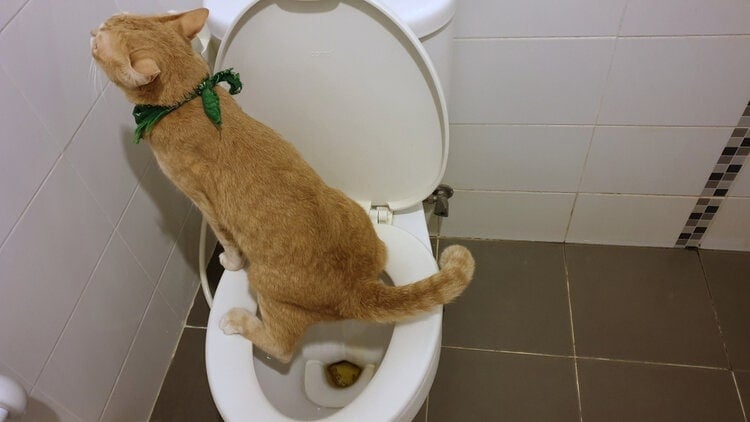Reasons You Should Never Flush Cat Poop Down Your Toilet - Important Information
Reasons You Should Never Flush Cat Poop Down Your Toilet - Important Information
Blog Article
The article listed below on the subject of How to Dispose of Cat Poop and Litter Without Plastic Bags is really motivating. Read it for your own benefit and figure out what you think about it.

Introduction
As feline proprietors, it's essential to be mindful of exactly how we dispose of our feline buddies' waste. While it might appear convenient to flush feline poop down the commode, this practice can have harmful repercussions for both the atmosphere and human wellness.
Alternatives to Flushing
Fortunately, there are safer and much more accountable means to dispose of pet cat poop. Consider the following alternatives:
1. Scoop and Dispose in Trash
The most common approach of getting rid of pet cat poop is to scoop it right into an eco-friendly bag and toss it in the garbage. Make certain to make use of a specialized litter scoop and deal with the waste without delay.
2. Use Biodegradable Litter
Choose naturally degradable feline clutter made from products such as corn or wheat. These clutters are environmentally friendly and can be securely disposed of in the trash.
3. Bury in the Yard
If you have a yard, take into consideration hiding pet cat waste in a marked location away from vegetable gardens and water sources. Be sure to dig deep adequate to prevent contamination of groundwater.
4. Install a Pet Waste Disposal System
Invest in a pet waste disposal system especially made for pet cat waste. These systems utilize enzymes to break down the waste, reducing smell and ecological effect.
Health Risks
In addition to ecological problems, purging feline waste can also pose wellness dangers to humans. Pet cat feces might include Toxoplasma gondii, a parasite that can create toxoplasmosis-- a possibly serious illness, specifically for expecting females and people with weakened immune systems.
Ecological Impact
Flushing cat poop presents damaging microorganisms and parasites right into the water system, presenting a considerable risk to aquatic ecosystems. These pollutants can negatively affect marine life and concession water quality.
Verdict
Liable animal possession extends past offering food and sanctuary-- it likewise entails appropriate waste management. By refraining from purging cat poop down the commode and choosing different disposal techniques, we can minimize our environmental impact and protect human health and wellness.
Why Can’t I Flush Cat Poop?
It Spreads a Parasite
Cats are frequently infected with a parasite called toxoplasma gondii. The parasite causes an infection called toxoplasmosis. It is usually harmless to cats. The parasite only uses cat poop as a host for its eggs. Otherwise, the cat’s immune system usually keeps the infection at low enough levels to maintain its own health. But it does not stop the develop of eggs. These eggs are tiny and surprisingly tough. They may survive for a year before they begin to grow. But that’s the problem.
Our wastewater system is not designed to deal with toxoplasmosis eggs. Instead, most eggs will flush from your toilet into sewers and wastewater management plants. After the sewage is treated for many other harmful things in it, it is typically released into local rivers, lakes, or oceans. Here, the toxoplasmosis eggs can find new hosts, including starfish, crabs, otters, and many other wildlife. For many, this is a significant risk to their health. Toxoplasmosis can also end up infecting water sources that are important for agriculture, which means our deer, pigs, and sheep can get infected too.
Is There Risk to Humans?
There can be a risk to human life from flushing cat poop down the toilet. If you do so, the parasites from your cat’s poop can end up in shellfish, game animals, or livestock. If this meat is then served raw or undercooked, the people who eat it can get sick.
In fact, according to the CDC, 40 million people in the United States are infected with toxoplasma gondii. They get it from exposure to infected seafood, or from some kind of cat poop contamination, like drinking from a stream that is contaminated or touching anything that has come into contact with cat poop. That includes just cleaning a cat litter box.
Most people who get infected with these parasites will not develop any symptoms. However, for pregnant women or for those with compromised immune systems, the parasite can cause severe health problems.
How to Handle Cat Poop
The best way to handle cat poop is actually to clean the box more often. The eggs that the parasite sheds will not become active until one to five days after the cat poops. That means that if you clean daily, you’re much less likely to come into direct contact with infectious eggs.
That said, always dispose of cat poop in the garbage and not down the toilet. Wash your hands before and after you clean the litter box, and bring the bag of poop right outside to your garbage bins.
https://trenchlesssolutionsusa.com/why-cant-i-flush-cat-poop/

I am just very excited about Can You Flush Cat Poo or Litter Down the Toilet? and I am praying you liked my blog post. Are you aware of another individual who is very much interested in the subject? Take a moment to promote it. We thank you for reading our article about Don’t flush cat feces down the toilet.
Services Report this page